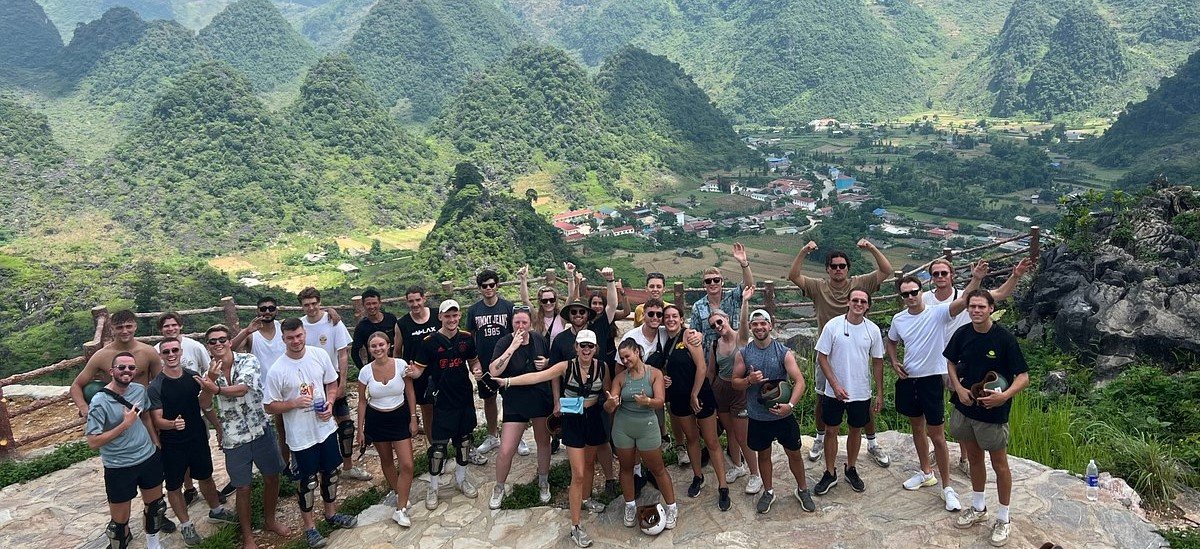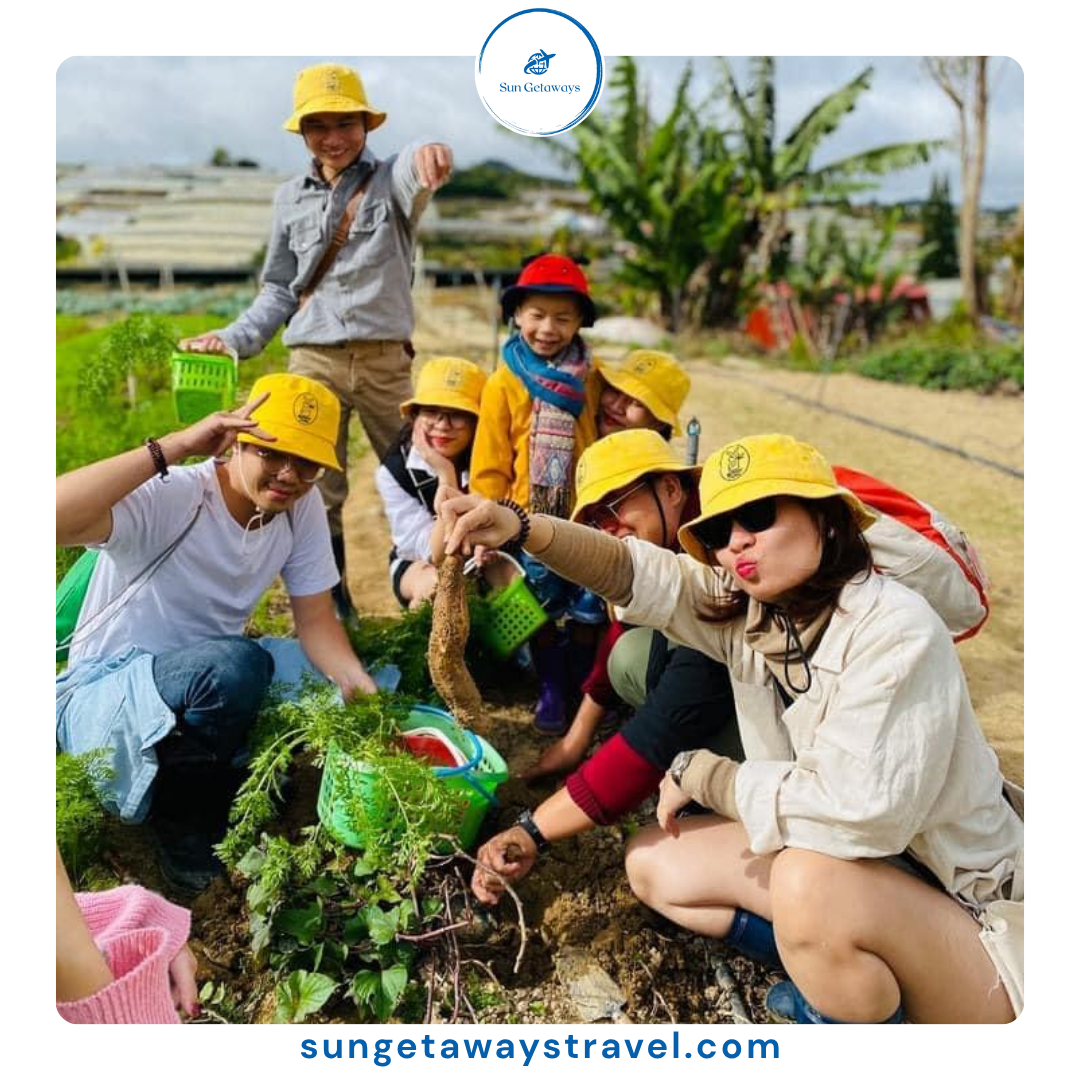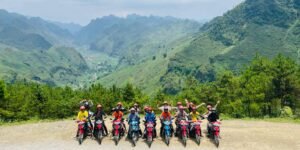The Ultimate Guide to Short-Term Volunteering on Farms in Vietnam
Vietnam, the land of lush rice terraces and vibrant agricultural traditions, offers an unparalleled opportunity for responsible travelers: volunteering on farms in Vietnam. This form of slow, meaningful travel allows you to exchange time and effort for room and board, offering deep immersion into the local culture and providing firsthand experience in Vietnamese eco farming.
Key Takeaways
- Volunteering on farms in Vietnam allows travelers to immerse themselves in local culture while learning sustainable agriculture practices.
- Participants enjoy meaningful experiences, such as cultural exchanges and hands-on skill development, in a slower, nature-connected lifestyle.
- Various farms like organic vegetable farms, coffee plantations, and permaculture eco-villages offer diverse opportunities for volunteers.
- Living conditions typically include shared accommodations and local cuisine, with a work schedule of 3–5 hours a day, 5–6 days a week.
- This volunteering not only supports local families but also fosters personal growth and a deeper appreciation for the environment.
🌱 Why Choose Short-Term Volunteering on Farms in Vietnam?
Short-term volunteering on farms in Vietnam offers benefits far beyond the typical travel experience. Instead of rushing from city to city, you settle into rural rhythm—waking up with the sun, learning farming techniques, interacting with local families, and sharing meals prepared with ingredients you helped cultivate. This is truly an immersive form of Vietnamese agricultural tourism.
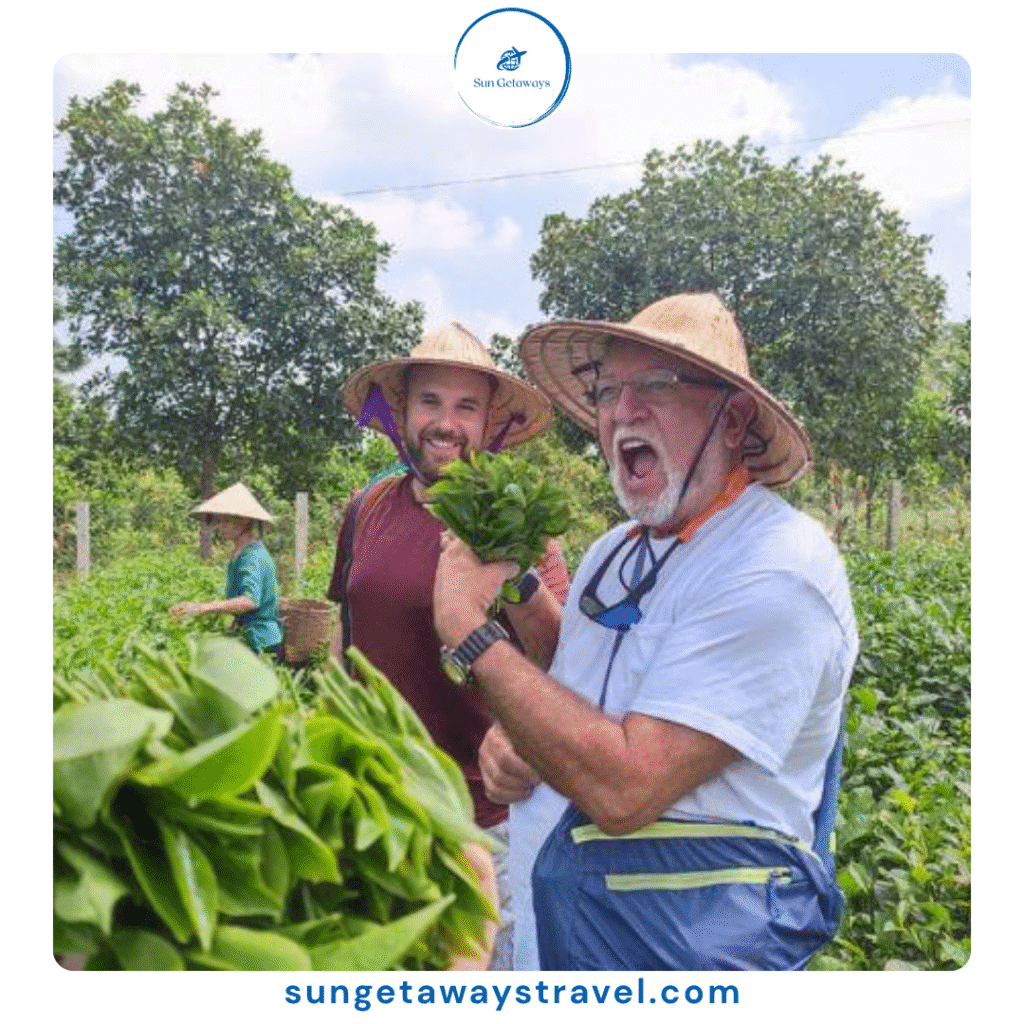

Some key reasons travelers love this style of travel:
✔ A meaningful cultural exchange
✔ Learning new hands-on skills
✔ Connection to nature and the environment
✔ Cost-effective travel experience
✔ A slower, more intentional lifestyle
For many volunteers, the experience becomes a personal retreat—away from digital noise, busy schedules, and urban work culture.
If you’re curious but unsure where to start, Sun Getaways Travel can help connect you with ethical farm stay in Vietnam hosts and assist with route planning, visas, and logistics.
🌾 What Kind of Farms Offer Volunteering in Vietnam?
Programs and farms vary, allowing you to choose an experience that aligns with your interests, lifestyle, and purpose. The variety is one of the biggest advantages of volunteering on farms in Vietnam.
| Farm Type | Primary Activities for Volunteers | Key Learning Focus |
| 1. Organic Vegetable Farms | Soil bed preparation, composting, natural pest control (e.g., using neem oil or herbs), harvesting. | Soil health, composting systems, pesticide-free farming, and sustainable crop rotation. |
| 2. Coffee and Tea Plantations | Assisting with harvesting (seasonal), processing (fermentation, drying, roasting/rolling), and quality sorting. | Post-harvest processing techniques critical to Vietnam’s famous Robusta coffee and fragrant teas. Consider a dedicated coffee farm tours in Vietnam for a deeper look. |
| 3. Permaculture Eco-Villages | Building natural structures (e.g., composting toilets, earth bag houses), water catchment systems, and setting up food forests. | Regenerative agriculture, low-impact living, community building, and integrated design (popular among eco farm volunteering Vietnam travelers). |
| 4. Rice Farms | Assisting with transplanting seedlings (May-June) or harvesting (Sept-Oct), depending on the season and region. | Traditional rice farming experience in Vietnam methods, water management, and the cultural significance of the rice cycle. |
| 5. Fruit Orchards / Gardens | Harvesting tropical fruits (jackfruit, mangoes, dragon fruit), pruning, and preparing seedlings for propagation. | Regional botany, fruit tree care, and sustainable practices specific to the Mekong Delta and Southern climate. |
🏡 What to Expect: Living & Working Conditions
Most short-term volunteering on farms in Vietnam programs follow a transparent exchange system: your work contributes labor in return for food and accommodation.
- Work & Time Commitment: Typically 3–5 hours/day, 5–6 days/week. Work starts early (around 6:30–7:00 AM) to avoid the midday heat.
- Accommodation: Expect rustic conditions: shared homestays, simple wooden bungalows, or communal dorm rooms. Private rooms are rare but sometimes available for a small fee.
- Meals: Food is often a highlight! Meals are homemade, seasonal, and hyper-local, usually featuring rice, fresh farm vegetables, herbs, homemade tofu, and soups. Vegetarian options are common due to the abundance of fresh produce, especially at eco farm volunteering Vietnam sites.
- Internet Access: Wi-Fi can be slow or non-existent, especially in remote Northern and Central Highland farms. This is a great opportunity for a digital detox.
📍 Best Regions for Volunteering on Farms in Vietnam
Volunteer placements are scattered across Vietnam, each region offering a distinct climate and cultural backdrop for eco farm volunteering Vietnam:
Northern Vietnam (Sa Pa, Ha Giang, Mai Châu)
Offers stunning mountain views, famous rice terraces, and cooler weather. Volunteers often work with Vietnam ethnic communities (Hmong, Dao) gaining unique insight into traditional mountain agriculture.
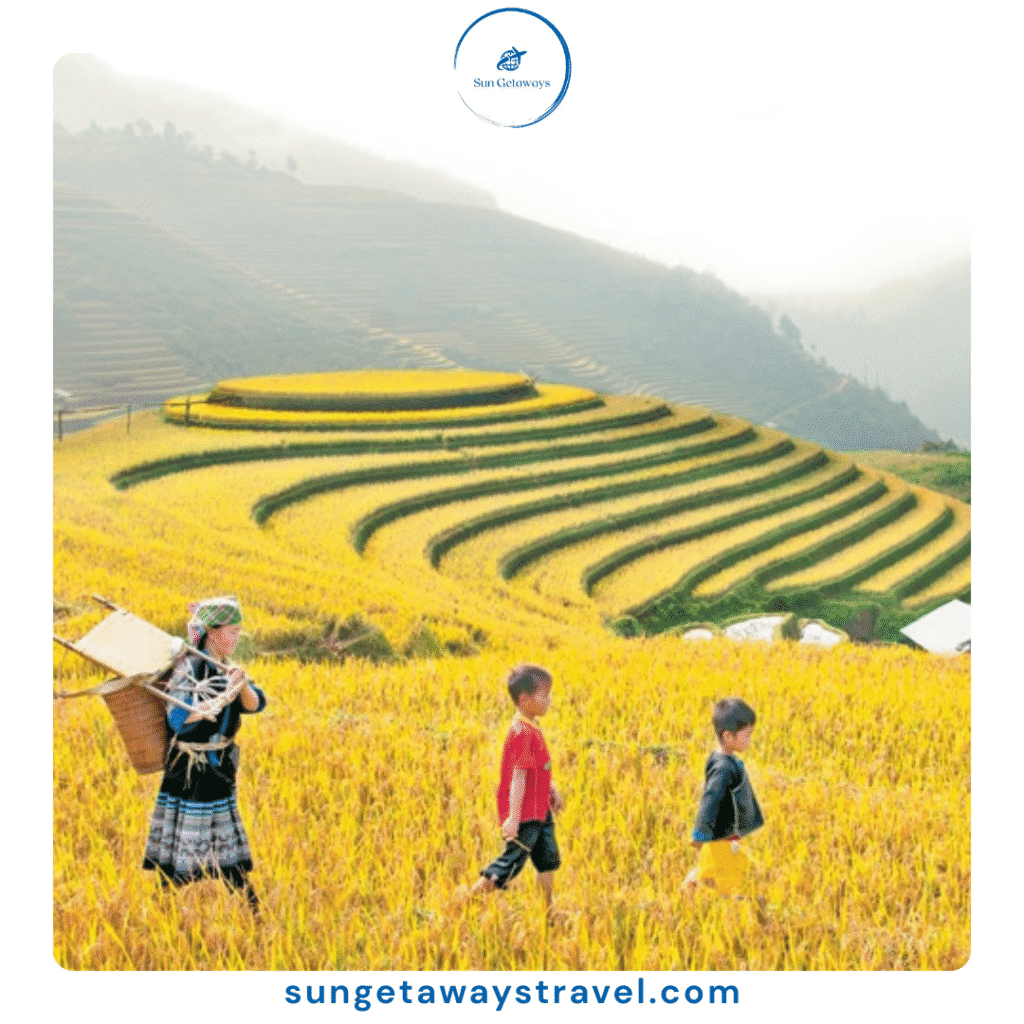

Central Highlands (Da Lat, Buôn Ma Thuột)
Ideal for intensive agricultural study, especially focused on high-value crops like specialty coffee, tea, and flowers. This region is leading modern sustainable agriculture Vietnam initiatives.
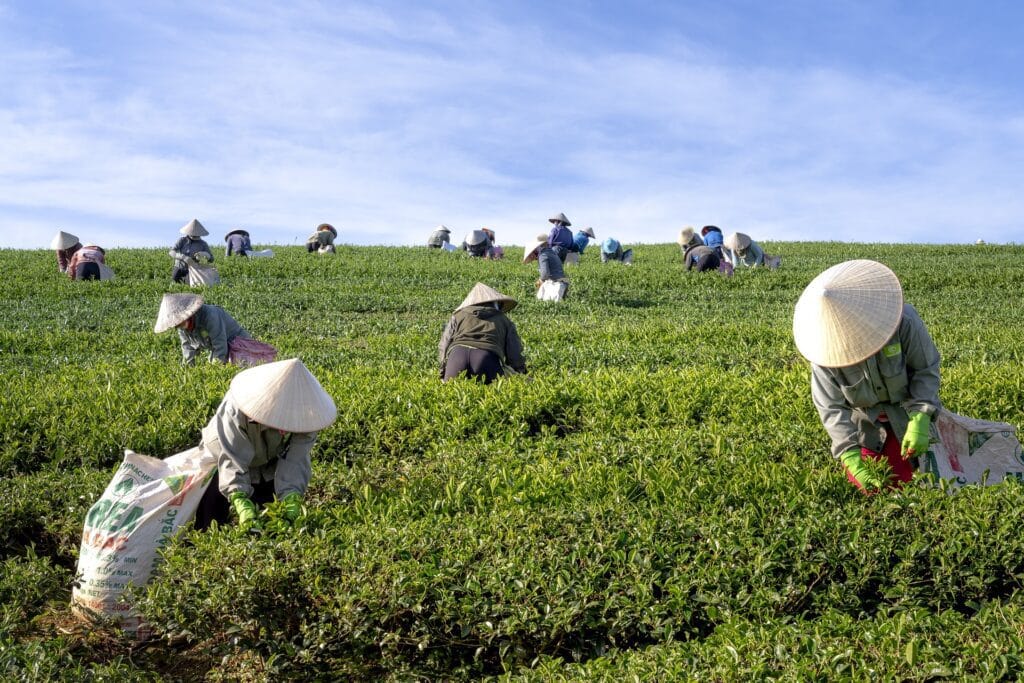

Southern Vietnam (Mekong Delta)
Famous for fruit farms, coconut plantations, and floating markets. The lifestyle is slower, highly immersive, and focused on aquatic agriculture along the river systems.


👩💼 Expert Perspective: Advice from a Vietnam Tour Specialist
To better understand the value and best practices of volunteering on farms in Vietnam, we asked Emma, a travel consultant with 12 years of experience designing eco-friendly tours and responsible volunteer placements, to share her insights:
“Volunteering on farms in Vietnam allows travelers to step into an authentic version of the country that most tourists never see. The key is approaching the experience with humility, openness, and respect. The best matches happen when volunteers see this not as free accommodation but as a cultural exchange built on mutual support.”
— Emma, Sustainable Travel Consultant
Her top tips include:
- Choose programs with clear expectations
- Ask hosts about sustainability values
- Be flexible—Vietnamese rural life changes with weather and seasons
- Learn basic Vietnamese greetings
Emma emphasizes that respectful curiosity makes the experience transformative for both host and traveler.
🧭 How to Choose the Right Volunteer Program
Before confirming your placement, consider:
| Evaluation Point | Why It Matters |
|---|---|
| Transparency of work duties | Prevents mismatched expectations |
| Living conditions | Comfort vs. rustic environment |
| Reviews or verified hosts | Ensures safety and ethical standards |
| Cultural support | Some farms offer workshops or language lessons |
| Sustainability practices | Especially important for eco-conscious travelers looking for organic farming tours Vietnam |
If you’re overwhelmed by choices, don’t worry—we helps match volunteers with trusted partners and reputable sustainable programs across Vietnam.
💬 Interested in joining a farm but need guidance or transportation assistance? Contact Sun Getaways Travel (WhatsApp) for a custom eco-volunteering plan.
👨🌾 Gaining Skills: The Academic Value of Farm Volunteering
The experience offers more than just memorable photos; it provides genuine, practical skills valued in fields like ecology, international development, and culinary arts.
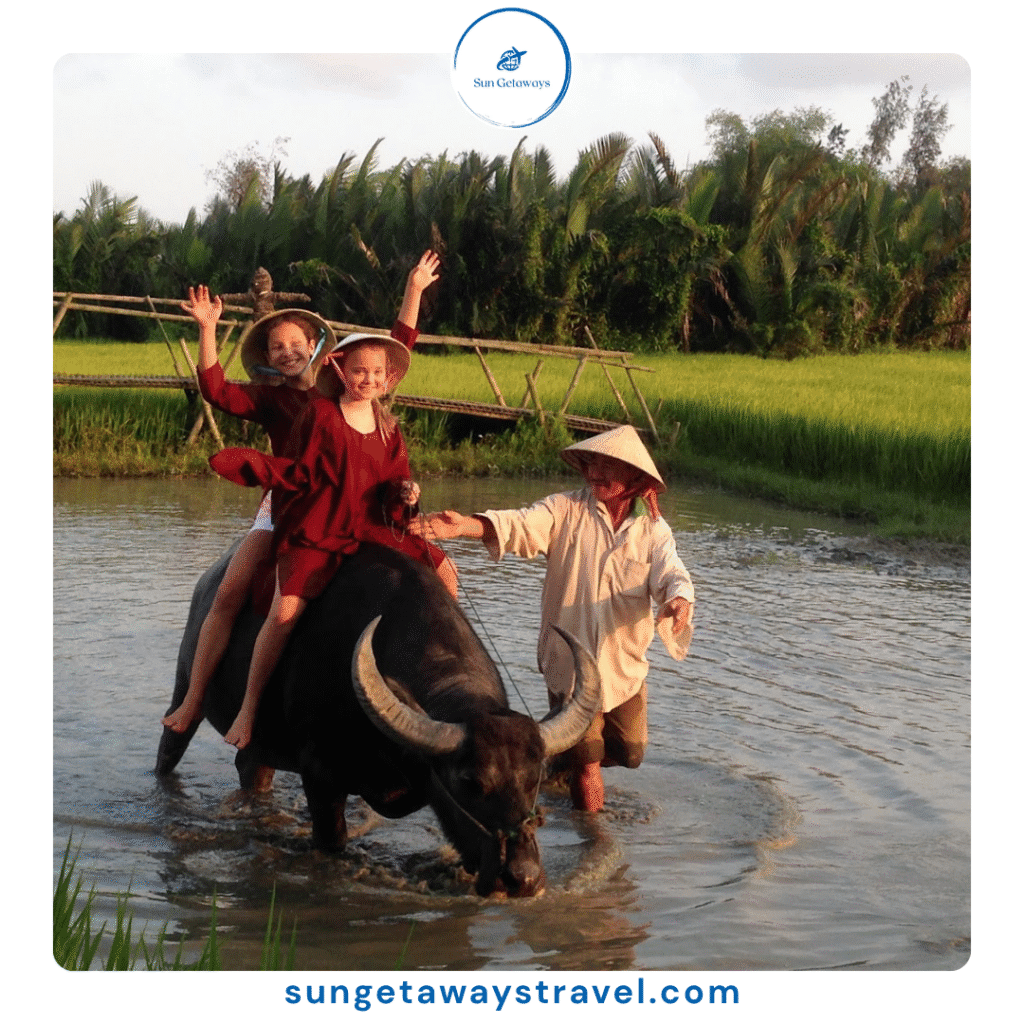

- Regenerative Agriculture: Learn how to build and maintain composting systems, create natural fertilizers, and manage soil health—core skills of modern sustainable agriculture.
- Agroforestry Design: Understand how farmers integrate trees, crops, and livestock for mutual benefit, maximizing land use efficiency.
- Food Processing: Acquire basic skills in drying, fermenting, and preserving foods, essential knowledge for culinary students and food enthusiasts pursuing Vietnam culinary experiences.
- Cultural Competence: Develop resilience, problem-solving skills, and superior cross-cultural communication by working directly with non-English speaking hosts.
💸 Budgeting and Costs
Many assume volunteering is free. While you save on typical hotel and restaurant costs, ethical farms often require a basic contribution or fee to maintain operations, covering utilities, supplies, and preparation for your stay.
| Expense Item | Typical Cost Estimate (USD) | Notes |
| Accommodation + Meals | $0 – $12/day (Exchange) | Fee sometimes charged by ethical farms to cover utilities, laundry, and unforeseen costs. |
| Program Fee | $0 – $50 (One-Time) | Some larger organizations charge an administrative fee for placement and vetting. |
| Transportation | $3 – $25 per trip | Cost varies widely (local bus vs. train/sleeper bus to remote areas). |
| Additional Expenses | $5 – $15/day | Personal snacks, excursions, SIM card data refills, and purchasing souvenirs. |
Despite these minimal costs, volunteering on farms in Vietnam remains significantly more affordable—and infinitely more meaningful—than traditional tourism. For a budget perspective, check our Vietnam travel budget guide.
🤝 Cultural Etiquette and Volunteer Mindset
Vietnamese rural hospitality is genuine, warm, and generous, but respect and mindfulness are expected. Embracing this mindset ensures a positive experience for both you and your host family when participating in eco farm volunteering Vietnam:
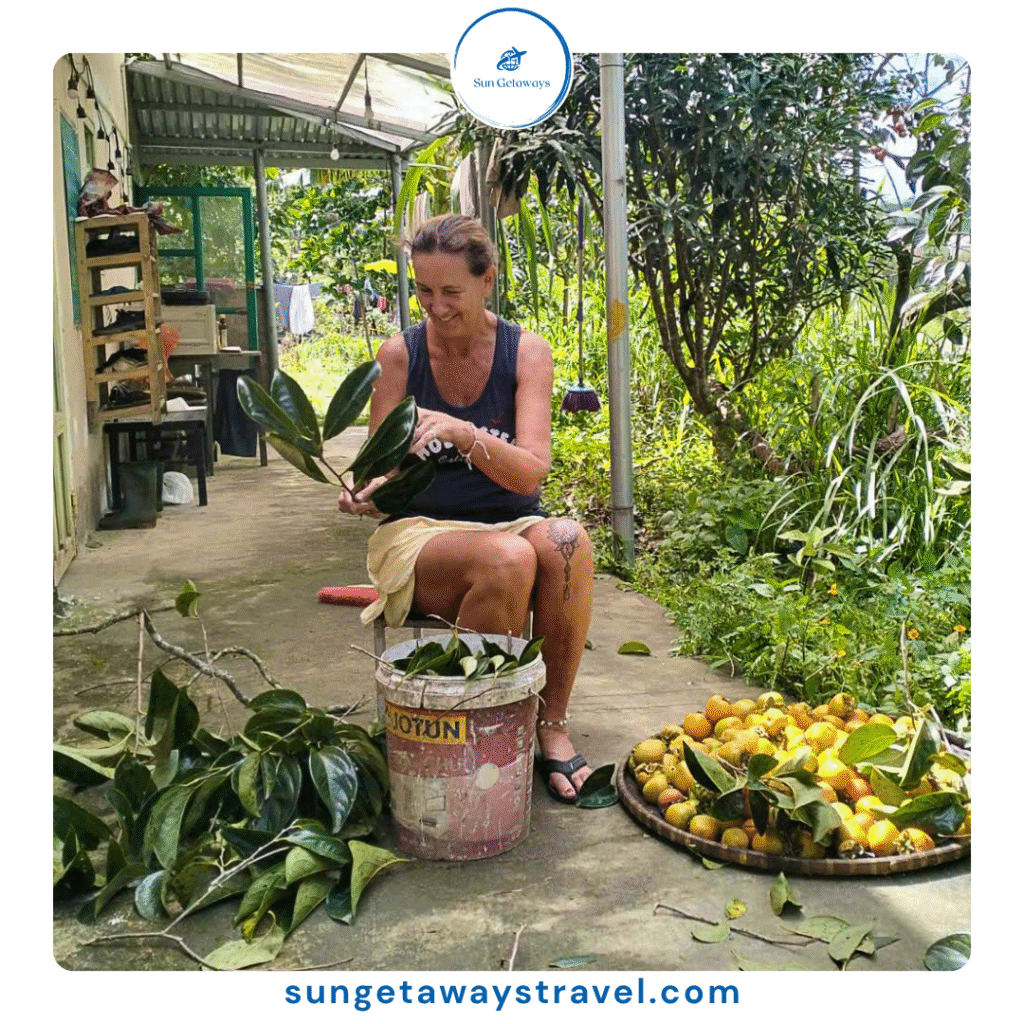

- Communication is Key: Arrive on time and communicate clearly about your physical limitations or dietary needs. A simple “Vietnamese phrases” “Xin chào” (Hello) and “Cảm ơn” (Thank you) go a very long way.
- Respect the Elders: Show deep respect for the elders (Grandparents/Parents) in the host family and community traditions. Always use both hands when handing items to them.
- Dress Code: Dress modestly when not working. Keep common areas clean and tidy, mirroring the generally immaculate state of rural Vietnamese homes.
- Photography: Always ask before taking photos of people, children, or inside temples/sacred spaces.
❤️ The Impact: Why This Experience Matters
Generally, short-term volunteering on farms in Vietnam offers profound two-way benefits:
- For the Community: Your physical labor reduces pressure on families, and your monetary contribution directly supports local families, helping them maintain their land and sustainable agriculture Vietnam practices.
- For the Volunteer: You gain deep cultural understanding, new friendships, practical skills, and a fundamental appreciation for the food systems we rely on. Many volunteers return home changed—more grounded, more grateful, and deeply connected to the world.
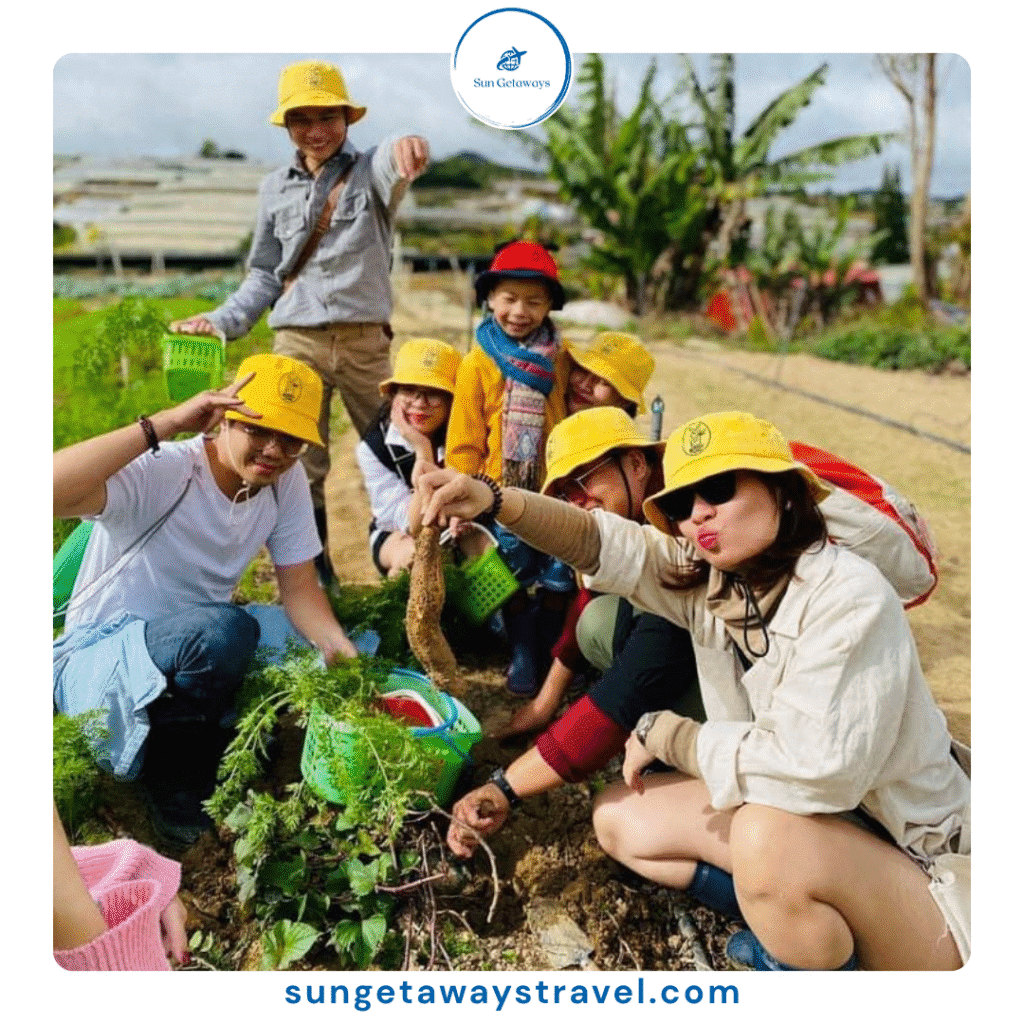

Planning your ethical journey can be complex due to the decentralized nature of farm placements. Sun Getaways Travel specializes in connecting travelers with vetted, ethical farms and managing all transport, ensuring your volunteer experience is safe, responsible, and truly impactful. Contact us to start crafting your unforgettable agri-tourism adventure.
Many volunteers return home changed—more grounded, more grateful, and more connected to the world.
❓ FAQs about Volunteering on Farms in Vietnam
No, most programs train volunteers on arrival, covering basic farming skills and tool use.
Basic English communication is common at tourist-oriented eco farm volunteering Vietnam sites, but learning some basic Vietnamese phrases (especially related to food/work) is highly appreciated.
Yes—many farms accept short-term stays, typically between one to four weeks.
Comfortable, durable clothes you don’t mind getting dirty, work shoes/boots, insect repellent, a hat, and a reusable water bottle.
Yes—Vietnam is considered one of the safest countries for responsible travel. However, travel insurance is always recommended, and you should always follow the advice of your host family.
Ask a question
Leave a Comment (0)
No questions yet. Be the first to ask a question!


